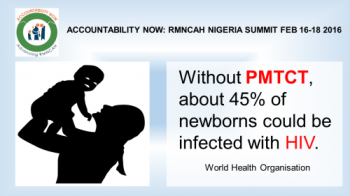Editor: The National Summit on reproductive, maternal, newborn, child and adolescent health (RMNCAH) will take place in Abuja on February 16-18. The inaugural Summit will address accountability in healthcare delivery for women, newborns, and other vulnerable groups.
By now it is no secret that Nigeria’s maternal and child health indicators, while improving, are still at very tragic levels. The numbers of children that die in childhood and mothers that die during childbirth in Nigeria has remained stubbornly high. Interventions that have worked in other countries have not worked as well in Nigeria. While some vertical intervention programmes have shown some impact, broad indicators have not changed significantly. UNICEF says that Nigeria is the second largest contributor to under-five and maternal mortality in the world. Surely, this cannot be accepted as “normal”. We simply cannot sit back and accept that our mothers and children will die of conditions no one else is dying of. It is time to step back and ask the question; why? Why are are so many women are still dying while pregnant and during labour; why are newborns and children dying from easily preventable conditions despite all the resources that have been thrown at the problem.
The question “why” is one that we do not ask often enough in Nigeria.
“Why” do programmes fail? Why are targets not met? Why are we so quick to move to the next project, to the next programme, to the next grand idea, without examining the past? We recently wrote a piece examining Nigeria’s performance on the Millennium Development Goals (they did have specific goals), before moving on the new Sustainable Development Goals and hoped that this would trigger a public debate. But apart from a few comments, we all shrugged our shoulders and moved on.
This needs to change. We must begin to hold ourselves, public health professionals, organisations working in the health space and our government accountable for our action and inaction when it comes to our children and mothers.
For three days next week, in Abuja, organisations working on maternal and child health, health reform and accountability in Nigeria, in collaboration with the Federal Ministry of Health will meet to address the issue of accountability in delivering healthcare services for Nigeria’s women and children at a summit titled: “Accountability Now: Advancing Reproductive, Maternal, Neonatal, Child and Adolescent Health in Nigeria“. The organisations leading this summit include; Champions for Change (C4C), which is working to build a movement of advocates for improved health outcomes for women, children, newborns and youth, the Health Reform Foundation Of Nigeria (HERFON), which works in the area of health policy advocacy, and Women Friendly Initiative (WFI), an advocacy group for RMNCAH primary care services.
Accountability is important. Nothing gets done in a system where no one is held responsible for delivering expected outcomes. The needed checks and balances in such a system are ignored, and in many cases discussions deteriorate to the classic ‘blame game’ where the problem is always someone else’s fault. In the meantime, another woman, another baby, and child, dies.
On his expectations of the summit, Dr. Emmanuel Abanida, Acting Executive Secretary of HERFON, said, “The RMNCAH conference is yet another step in our collective efforts to run the last mile in opening the vista of basic health services to the most vulnerable.”
The Summit will discuss the new 2030 Sustainable Development Goals, as well as examine how effective ongoing efforts are in delivering interventions to women and children in Nigeria, especially where there are existing opportunities that are already working, which need scaling up. The Summit will also provide a forum to discuss how to infuse accountability mechanisms into both local and national initiatives that target reproductive, maternal, newborn, child and adolescent health. One of the goals of the Summit is to build alliances across the public and private sector with the goal of strengthening collaboration between key actors in civil society, government, media, and religious institutions.
Minister of Health Prof. Isaac Adewole is set to launch a global mobile project focused on improving adolescent’s access to health care services at the Summit, and give the opening keynote on the status of RMNCAH in Nigeria. We will of course be listening out for his promises, and prepare to hold him accountable for their delivery. Other headliners at the event will include Minister of Environment Amina Mohammed, who was previously a Special Adviser to UN Secretary-General, Ban Ki-Moon on Post-2015 development planning.
The Summit is meant to come up with key resolutions that will influence the nation’s policy as it develops a national accountability plan to ensure progress on the SDGs can and will be measured, with the overall goal being to improve healthcare delivery for women, newborn, children and adolescents in Nigeria.
At Nigeria Health Watch, we would hope that the Summit will end with an explicit accountability agenda, that will be measurable, and shared publicly, without fear or favour to monitor access to the services needed to save Nigeria’s women and children.
They are waiting, and in the meantime… they are dying.
For more information about the RMNCAH National Summit, please visit Champions for Change.






Sadly, if there is one thing we Nigerians don’t value, its putting words into action. This summit from the above article wolill make a lot of changes, but the question is, can it be sustained?